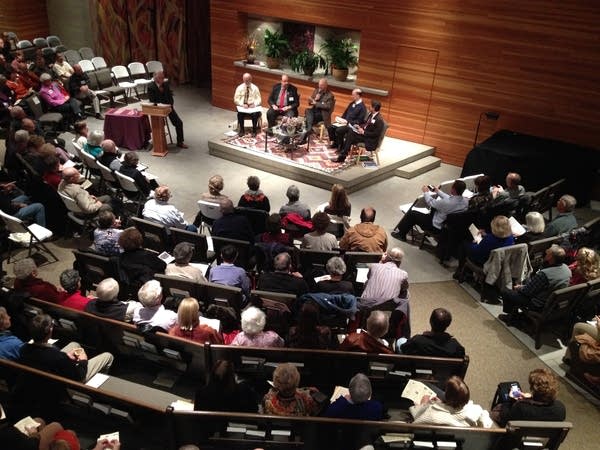Mahtomedi frac sand mining forum draws hundreds over concerns
Go Deeper.
Create an account or log in to save stories.
Like this?
Thanks for liking this story! We have added it to a list of your favorite stories.

Fears that a Wisconsin-style frac sand mining boom could reach the east metro communities of the Twin Cities drew a crowd of more than 300 people to a forum Tuesday night in Mahtomedi.
It isn't likely that Washington County and surrounding areas would become the next site for industrial sand mining to supply hydraulic fracturing rigs with silica sand. But there was consensus that Wisconsin's experience, where many mines have clashed with local communities and in some cases have violated environmental laws, should not be repeated.
"Minnesota is not Wisconsin," said Dennis Egan, who represents the Minnesota Industrial Sand Council. Egan said Minnesota currently has nine silica sand mining operations, and only three new permits have been issued in the past year or so.
According to Wisconsin Watch, Wisconsin has more than 100 permitted frac sand mines or processing facilities.
Turn Up Your Support
MPR News helps you turn down the noise and build shared understanding. Turn up your support for this public resource and keep trusted journalism accessible to all.
Egan joined Department of Natural Resources Commissioner Tom Landwehr, St. Charles Mayor Bill Spitzer, state Rep. Peter Fischer and Maiden Rock, Wis., resident Fred Harding on stage at the event held at White Bear Lake Unitarian Universalist Church. Former WCCO anchor Don Shelby moderated the discussion.
Egan said the few companies in Minnesota that are developing frac sand mines are local companies that are committed to a multi-year environmental review process and are willing to spend millions of dollars to meet state regulations.
"There's a community interaction because that's the way the state of Minnesota has set this up," he said.
Minnesota has new laws that prohibit silica sand mining in parts of southeastern Minnesota, and the state is working on more specific rules to protect communities and the environment.
Egan said Minnesota's existing laws are stringent enough, but Fischer said more regulations could be considered during the next legislative session, including a tax on sand leaving the state.
"Not all companies are going to be responsible," said Fischer, DFL-Maplewood. "As a Legislature, we're going to keep an eye on it going forward. This is an evolving process."
Landwehr said a new setback rule for frac sand mines in southeastern Minnesota will help protect water in the fragile karst region. But he said problems could still arise if a large number of mines were developed.
"I think there are some gaps," Landwehr said. "We don't have the ability to look at the cumulative impact."
Harding, who lives near a frac sand mine and became heavily involved in the issue, said concerns in his community range from truck traffic to dust. He encouraged the audience to get involved.
"My experience with industrial sand mining, I hope and pray, is not like yours," he said. "You guys have the opportunity to get it right. Take that opportunity."





